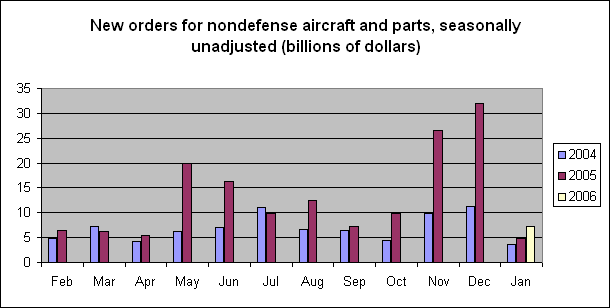There are things you may fret about, but the most recent statistics on durable goods orders shouldn’t be one of them.
Orders to U.S. factories for big-ticket manufactured goods fell by the largest amount in 5-1/2 years in January as demand for commercial aircraft suffered the biggest setback in seven years, the government reported Friday. The Commerce Department said that orders for durable goods, everything from computers to cars, fell by 10.2 percent last month, a much bigger decline than had been expected. The weakness was led by a [seasonally adjusted] 68.2 percent drop in orders for commercial aircraft reflecting a falloff in sales at Boeing Corp. (BA) after two very strong months. Analysts said the overall decline overstated the weakness in manufacturing because it was so heavily influenced by the volatile aircraft sector.
 |
The above graph puts those aircraft figures in perspective. The phenomenon driving the
December-to-January drop was not a low level for January (which was about the median value for 2005) but rather unusually high levels in November and December. Excluding transportation, seasonally adjusted new durable goods orders would have shown a 0.6% rise rather than a 10.2% drop in January.
Given the dismal 2005:Q4 GDP figures and narrowing yield spreads, some were waiting to see the other shoe drop. This isn’t it.
Why do nearly all news stories about these matters neglect to state whether the quoted growth/decline rate is year-over-year or month-to-month, and if the latter, whether the rate is annualized? (And if the figure is year-over-year, whether it’s real or inflation-adjusted.)
Good point, JM. The figures referred to in the Fox News story are month-month changes, quoted at monthly rate, in nominal terms and seasonally adjusted.
Fed Watch: Comfortable With Expectations
Tim Duy’s Fed Watch: Fed policymakers keep repeating that policy is now data dependent. That’s great – as long as all the policymakers agree on what the data is telling them. But what if unpredictable weather is leaving the data